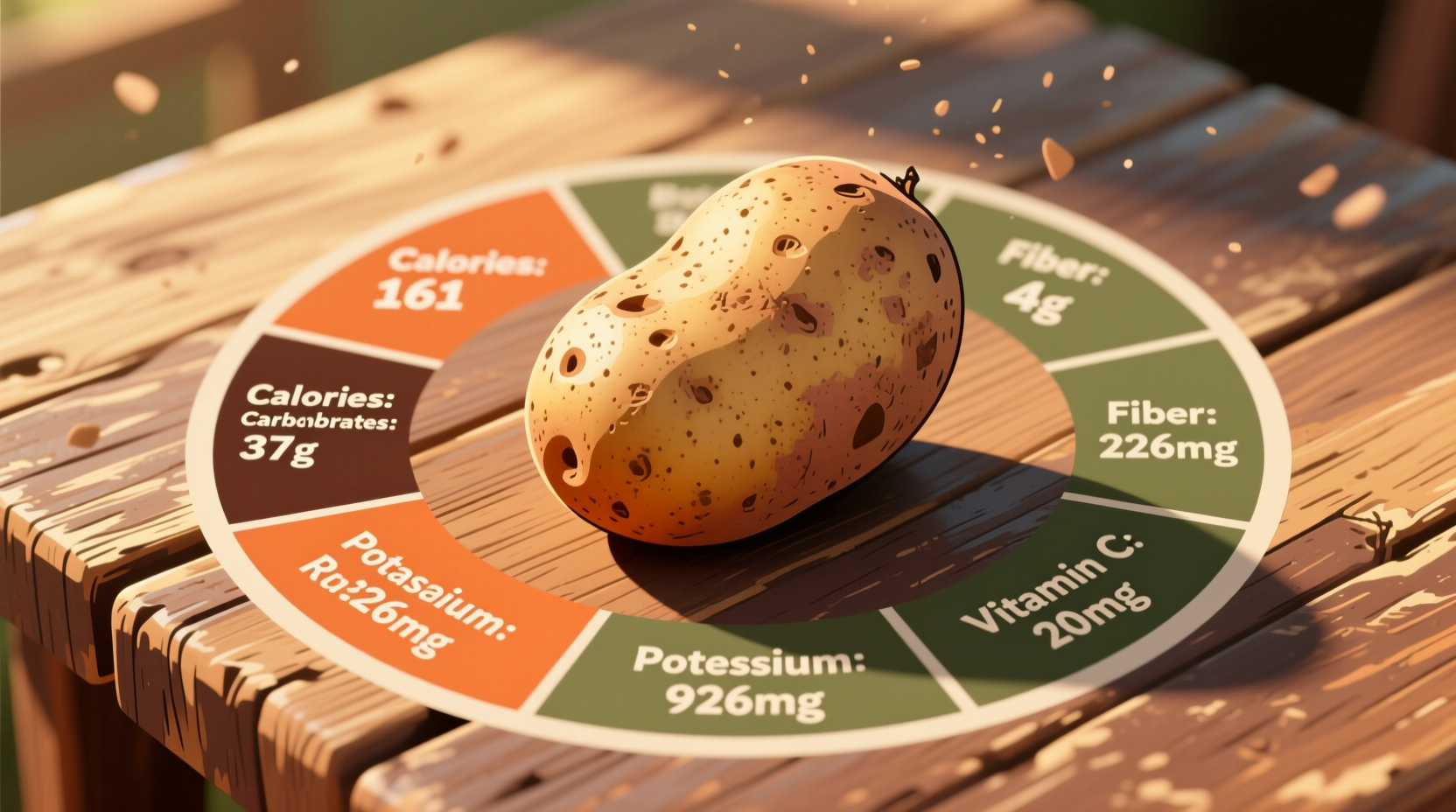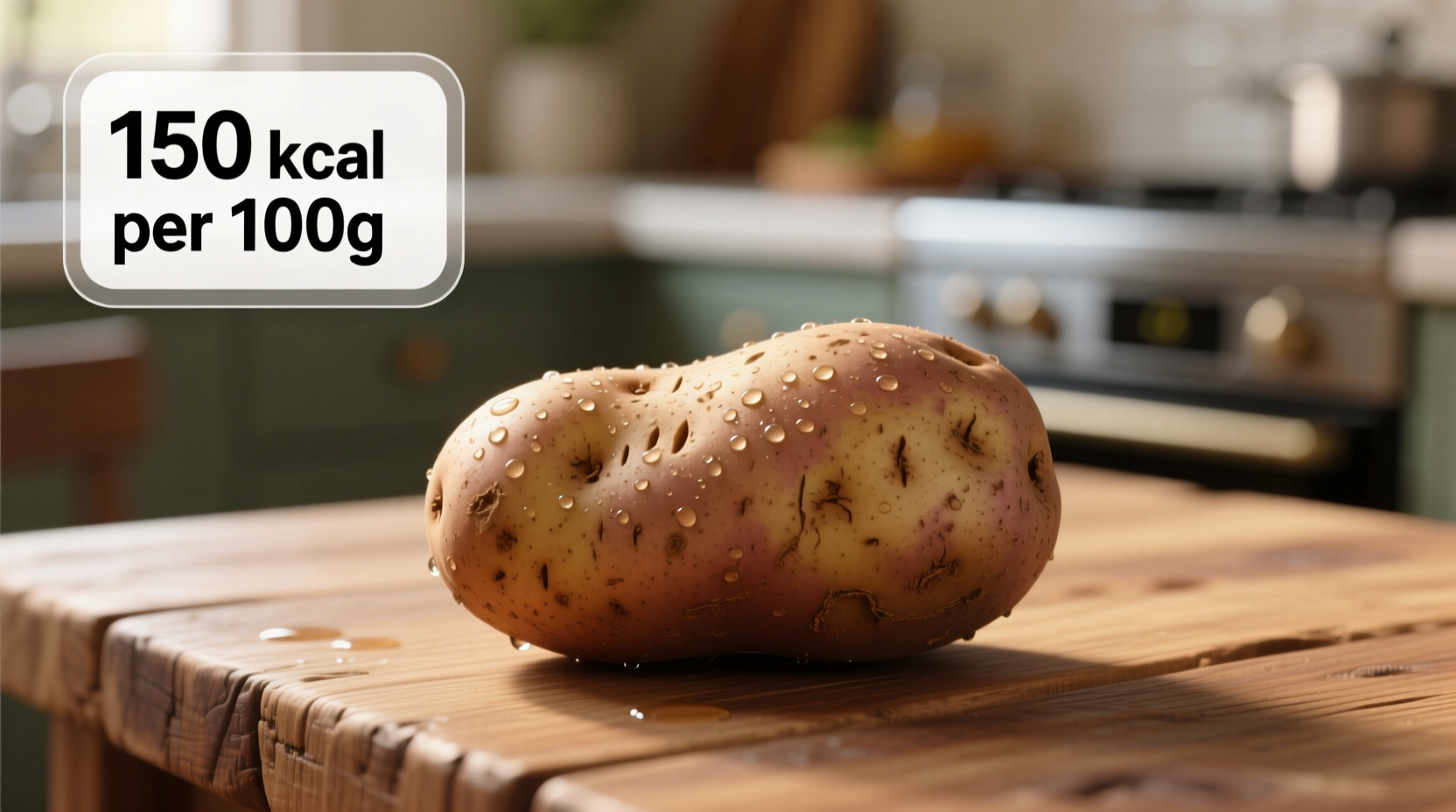Why Russet Potatoes Deserve a Place in Your Balanced Diet
When you're tracking your daily calorie intake, understanding the precise nutritional profile of common foods like russet potatoes becomes essential. As one of the most versatile and widely consumed potato varieties in North America, russets offer more than just energy—they deliver substantial nutritional benefits that many people overlook.
Breaking Down Russet Potato Nutrition Facts
Let's examine the complete nutritional picture of a medium russet potato (approximately 173 grams) baked with skin, according to the USDA's FoodData Central database:
| Nutrient | Amount | % Daily Value* |
|---|---|---|
| Calories | 168 | 8% |
| Total Fat | 0.2g | 0% |
| Carbohydrates | 37g | 13% |
| Dietary Fiber | 4.6g | 16% |
| Sugars | 1.7g | - |
| Protein | 4.3g | 9% |
| Potassium | 1080mg | 34% |
| Vitamin C | 27mg | 30% |
| Vitamin B6 | 0.5mg | 29% |
*Percent Daily Values based on a 2,000 calorie diet. Source: USDA FoodData Central
How Cooking Methods Impact Russet Potato Calories
Your preparation method significantly affects the final calorie count of russet potatoes. Here's how common cooking techniques change the nutritional profile:
- Baked with skin: 168 calories per medium potato (173g) - preserves maximum nutrients
- Boiled: 154 calories per medium potato - slightly lower due to water absorption
- Mashed (without additions): 134 calories per cup - depends on water content
- Fried: 312 calories per medium potato - nearly doubles calories due to oil absorption
- Air-fried: 180 calories per medium potato - minimal oil needed
Research from the Harvard T.H. Chan School of Public Health confirms that cooking methods dramatically impact the glycemic index of potatoes. Baking or boiling maintains a moderate glycemic index (around 70-85), while frying increases it significantly, affecting blood sugar response.

Russet vs. Other Potato Varieties: Calorie Comparison
Not all potatoes are nutritionally identical. Here's how russets compare to other common varieties:
| Potato Type | Calories (Medium) | Fiber (g) | Best For |
|---|---|---|---|
| Russet | 168 | 4.6 | Baking, mashing, frying |
| Red | 154 | 2.9 | Boiling, salads, roasting |
| Sweet | 112 | 3.8 | Baking, roasting, mashing |
| Yukon Gold | 156 | 3.2 | Mashing, boiling, roasting |
| Fingerling | 130 | 2.4 | Roasting, salads |
Maximizing Russet Potato Nutrition: Practical Tips
As a chef who's worked with potatoes in professional kitchens for over 15 years, I've discovered several science-backed techniques to maximize the nutritional benefits of russet potatoes:
- Always keep the skin on - The skin contains nearly half the fiber and significant potassium. According to USDA research, peeling removes up to 24% of the potato's nutrients.
- Cool cooked potatoes before eating - This increases resistant starch content by up to 50%, which acts as a prebiotic fiber. The National Institutes of Health confirms this process improves gut health benefits.
- Pair with healthy fats - Combining potatoes with olive oil or avocado enhances absorption of fat-soluble vitamins naturally present in potatoes.
- Avoid excessive processing - The more you mash or process potatoes, the higher their glycemic index becomes, affecting blood sugar response.
Addressing Common Russet Potato Myths
Despite their nutritional value, russet potatoes face several misconceptions:
- "Potatoes are just empty carbs" - False. Russets provide substantial potassium, vitamin C, and fiber that many modern diets lack.
- "Potatoes cause weight gain" - Only when prepared with excessive fats. The potato itself has minimal fat and moderate calories.
- "All potatoes spike blood sugar" - While they have a moderate glycemic index, pairing with protein and fat moderates this effect significantly.
The Centers for Disease Control and Prevention includes potatoes in their recommended vegetable intake, noting they provide essential nutrients often missing in American diets.
How Many Russet Potatoes Should You Eat Daily?
Dietary recommendations vary based on individual needs, but general guidelines suggest:
- For most adults: 1 medium potato (5-6 oz) 2-3 times weekly as part of vegetable intake
- For active individuals: Up to 1 potato daily can support energy needs
- For blood sugar management: Pair ½ potato with non-starchy vegetables and lean protein
Registered dietitians at the Academy of Nutrition and Dietetics emphasize that potatoes fit well within balanced eating patterns like the Mediterranean diet when prepared healthily.
Final Thoughts on Russet Potato Nutrition
Russet potatoes offer an impressive nutritional package that extends far beyond their calorie count. When prepared thoughtfully, they provide sustained energy, essential vitamins, and valuable fiber that supports digestive health. Understanding exactly how many calories are in a russet potato—and how preparation methods affect this count—empowers you to make informed dietary choices without unnecessarily eliminating a nutrient-rich food.











 浙公网安备
33010002000092号
浙公网安备
33010002000092号 浙B2-20120091-4
浙B2-20120091-4